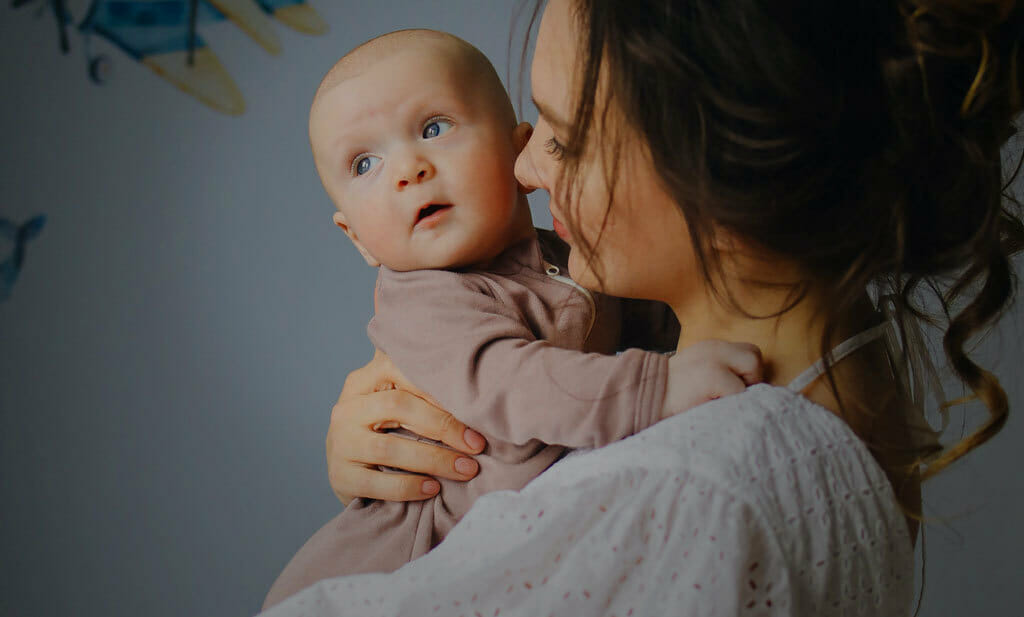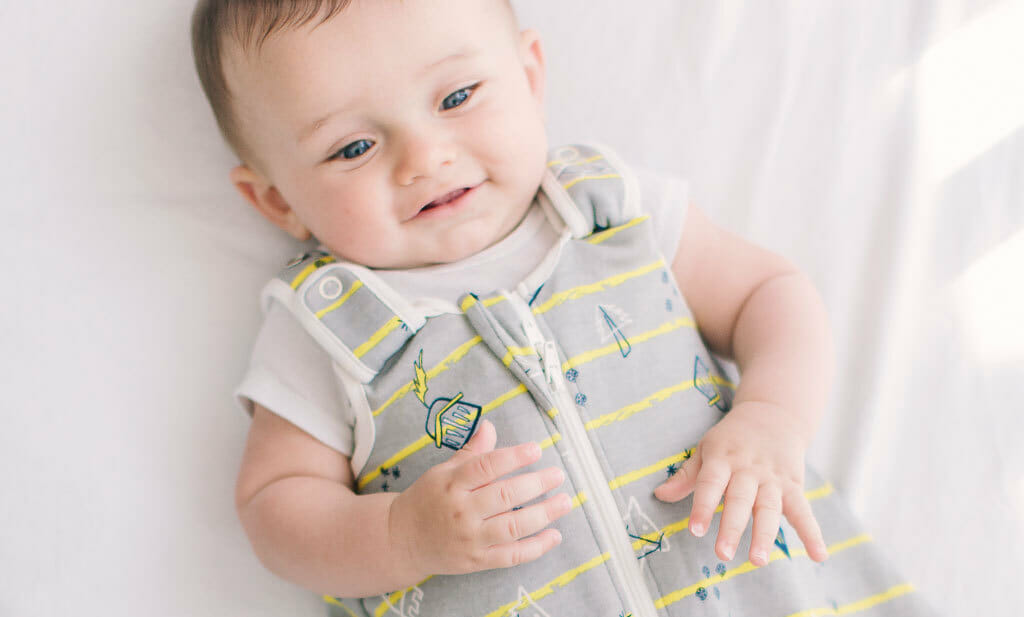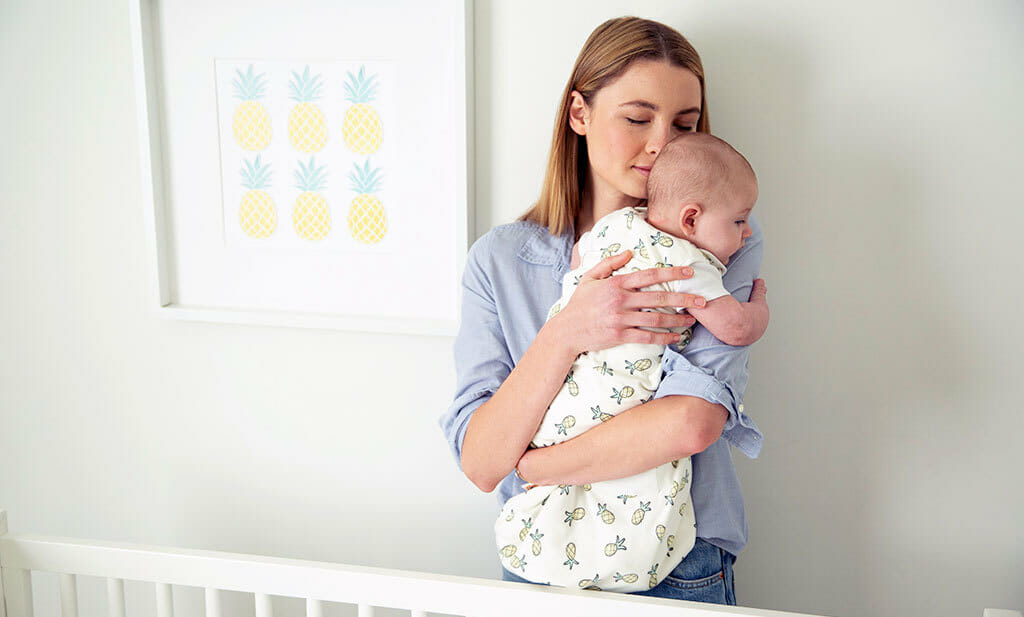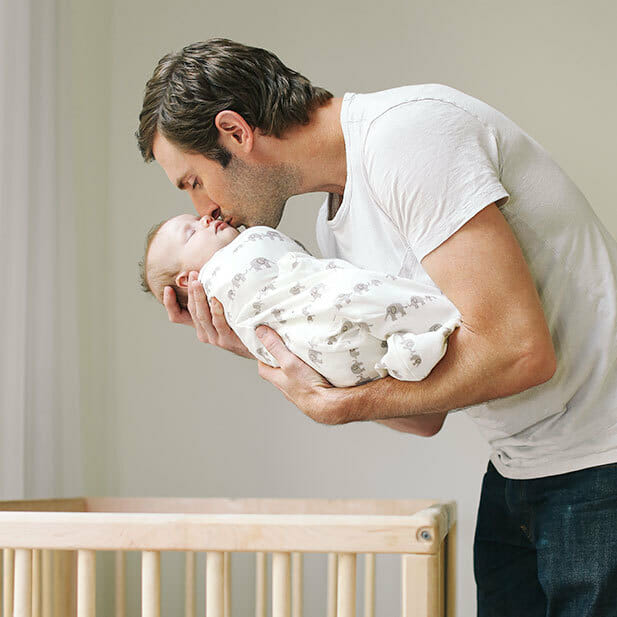
Urgh. I’ve been there, almost every parent has been in the same boat. Night waking is tough to get used to. Pre-babies, I used to work night shifts. However, nothing prepares you for when your brand new baby arrives on the scene and the frequent night wakings start to rob you of enough sleep to function the next morning!
Sleep disruption and sleep deprivation is HARD.
There’s a whole load of reasons why your baby may wake at night, some developmental, some habitual, some completely normal.
Our UK sleep specialist Gemma Coe is a mum of two herself and as a certified baby and child sleep consultant. She helps families all over the world develop healthy sleep habits. Today, Gemma takes a look at the top ten reasons your baby may be waking at night.
1. Sleep environment
This is like a corner piece in a jigsaw. It may seem tiny, but it’s important. Light sleepers can be easily woken by a change to their surroundings. Whether that’s light creeping into the room in the early hours, or the radiator pipes clanking away in the morning.
Some white noise animals and machines turn off after 45 minutes. They may fall asleep happily, but this may lead the baby to wake fully at night as they notice there has been a change in their environment since they fell asleep.
Think dark, calm and boring. Try to have them fall asleep in the same conditions that will be there all night long. No fancy-pants sleep props and aim for a temperature of around 18 degrees.
2. Hunger
The most common reason why young babies wake at night is because they wake hungry and get hangry! Their tiny tummies can only hold so much and need to be topped up frequently. As they grow, those tummies can hold more, and the need for night feeds will decrease.
Most babies will start cutting them around 6-9 months of age, whilst other baby’s will need feeds for a bit longer, possibly past their first birthday.
If you’re unsure what your baby needs, have a chat with your health visitor, lactation consultant or other health professional.
3. Scheduling issues (over-tired or under-tired)
Naps a total failure? Cap napped all day? Only took one nap instead of two? Danger nap in the car on the way home? A whole load of sleep problems can be caused by over tiredness. Equally under tiredness, where they may have had long day naps or naps too close to bedtime, can cause bedtime delays and night wakes too.
In the first three months it’s likely your baby will be sleeping 15-17 hours in any 24 hour period, then reducing to 14-15 until they reach about 9 months of age.
If your nights are quite disrupted, you may want to try to work towards a nap schedule for a few weeks, increasing your little ones total day sleep where possible. If they’re refusing their last nap then make the most of your carrier or pram and get out for a brisk walk.
Better day sleep should reduce overtiredness at bedtime and therefore help reduce night waking.

4. Parental involvement
I get it. I’ve been there. Baby stirs, and you feel if you just soothe them really quickly you may just get them back to sleep and avoid a full blown waking, right?
Hold your horses there! As we pass through sleep cycles, we move through lighter, partial waking stages. They can appear to be fully awake, but may not be.
If your baby wakes at night, just give them a few moments to settle down and see whether they really need your help. They may just fuss for a bit, play with their hands, may even be awake for a while and drop back off.
Baby sleep is a weird one. But try not to jump straight in, if they’re only partially awake, you may risk waking them completely.
5. They’ve just hit a developmental milestone
Sleep is a prime time for all those connections in the brain to be made. Hitting new developmental milestones (or working towards them) can absolutely affect sleep.
The regressions after the 4 month sleep regression all tend to coincide with big developmental milestones too. Alongside physical developments such as crawling and walking, sometimes they may also expand their emotional and social skills.
Some of the later bouts of separation anxiety can stem from becoming more aware of the world around them, the world may seem a little more scary when they get to about 2 years of age, and this can affect bedtimes and increase night wakes.
You may notice your child talking, crawling, pulling up to stand or taking steps in their sleep! This is all perfectly normal and try not to feel you need to intervene. They’re just doing what babies do best – learn!

6. The dummy/pacifier
It’s not much of a pacifier if it needs to be replaced is it?! I’m a huge fan of dummies for naps and bed, but only IF they bring comfort.
If a child wakes and needs their dummy/pacifier to be replaced every 45 minutes you have 2 options.
1) Get rid of it – often easier before they really develop an emotional attachment, pre 6 months of age.
2) Teach them to find and replace at night. This skill can be taught from about 8 months of age. Then fill the cot with lots of them so it makes it easier for them to find one at night.
7. Split nights
I REALLY feel for my clients who have split nights. They’re long periods of time awake in the middle of the night, where a baby can appear totally awake and simply stay awake. They will probably have trouble falling asleep again. Usually split nights are caused by routines not quite on point, so the child is either overtired or under-tired going into bedtime.
Occasionally split nights can be caused by medical conditions such as sleep apnoea. So if you’re worried at all, have a chat with your GP.
8. Teething or health issues
How many of your baby’s sleep disturbances have you put down to teething? Go on!
Teething, colds, sickness can all affect sleep quality. And then there’s also the dirty nappy too…
You know as an adult how tough it is to get a good night’s sleep when you’re full of cold. These phases pass, don’t force them. Allow time and space for some extra cuddles and comfort, but try and get back into your good bedtime routine when it’s passed and they’re feeling much better.

9. Natural sleep patterns
On the whole, most children from around 4 months of age will have more of an adult-like sleep cycle where they pass through phases of sleep. At the beginning of the night, your baby tends to be in a really deep sleep which lasts for around 4 hours. They’ll then wake and go through more frequent sleep cycles. They can be easily woken every time they get to these lighter stages of sleep.
10. Sleep disruptions, sleep disorders
Night terrors tend to happen in the first half of the night, the deep stages of sleep. This can be hard to witness for many parents. However it’s unlikely your child will remember. Eventually they’ll return to the same position on the bed and fall asleep again.
Nightmares tend to happen in the second half of the night when we go through lots of sleep cycles. You’ll find this more commonly affecting toddler sleep rather than baby sleep. You may need to address any recent changes, fears and anxieties and provide lots of reassurance as these are night wakings they’re likely to remember.
Both nightmares and night terrors can be made worse when sleep schedules are out of whack and your kiddie is over tired going into their nighttime sleep. If you’re noticing this, try and prioritise naps or an early bedtime for a couple of weeks and see if it helps.

“Why is my baby waking at night?” – here are our expert tips to help:
- If you can’t hear your baby crying, then hold off from intervening for a bit as you don’t want to make things worse. This will also avoid setting any bad habits where they expect you to be there constantly!
- If your baby is a light sleeper then use white noise and a consistent environment. Not just during the bedtime routine, but in the middle of the night through to morning too. Remember, white noise doesn’t necessarily send your baby to sleep, but is does help many babies stay asleep!
- Frequent night wakings are part and parcel of being a baby. Setting good sleep habits in place are like the pieces of a jigsaw. You can’t complete the picture (getting them to sleep independently) without them. You may still have to work on how your baby falls asleep, so they’re able to self soothe after the bedtime routine and then sleep longer stretches. Good sleepers tend to require a lot of practice, patience and consistency!
- Sleeping through the night is a bit of a myth. Partial wakings are common, happening all through the night. You may see your baby doing some really odd things on the monitor during the night. This doesn’t mean they’re completely awake though. They’ll quite possibly be able to self settle again. See it as an opportunity to practice.
If you are experiencing difficulties with your child’s sleep at night or sleeping patterns, please get in touch, reach out via instagram, book a free call or see my other services. You can also check out more of my blog posts here




